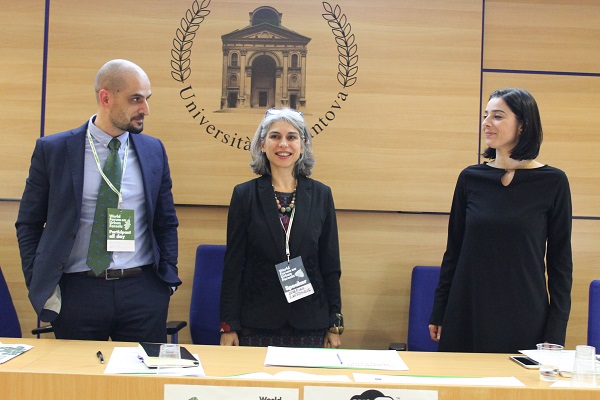The so-called "nature-based solutions" (NBS) are the latest trend in the environment domain. The use of natural infrastructures, such as vertical gardens, green roofs or green walls, to tackle socio-environmental challenges has been around for decades, but only recently has it started to be systematically researched.
Now even world events have begun to focus on NBSs. This was the case with World Water Day 2018, whose theme was "Nature for water", and the 1st World Forum on Urban Forests, that recently took place in Mantua, Italy. There we met Josefina Enfedaque, EU policy officer for Biodiversity, Ecosystem Services and Public Engagement in Nature-Based Solutions, to get some insight into this research field.

Josefina Enfedaque
When did the EU decide to invest public money in this specific research field, nature-based solutions, and why?
NBSs started to be a buzzword around 5 years ago. You have to think that the current framework programme was written around 2012-2013, after the 2008 crisis, and the priorities of the EU were growth and jobs. So a lot of funding was put into innovation and biodiversity researchers started envisioning NBSs.
Is there any lobbying for nature-based solutions?
No, scientists don't lobby in biodiversity or natural sciences in general - except for health – because there is no power industry behind them. The thing is very fragmented, although it’s a big area with a lot of money moving about. For example, urban renovation in many cases is still in the hands of architects who know nothing about NBSs. There could be a lot more money in the market for that, but everything is very fragmented.
After the May 2019 elections, a new executive will head the EU. What will happen to NBS policy?
Biodiversity is related to climate change, and so NBSs are also involved here. I therefore expect sustainability will remain a priority. We are trying to keep NBSs in the next funding cycle. Our proposal is already at the Parliament… So the current Parliament will vote before the elections. And I think we’re beginning to gain the critical mass for starting a transition.
Do you have some data about this “critical mass”?
We did a Eurobarometer study three years ago, where over half (53%) of respondents thought there were enough natural features in the area in which they lived, with more than two in five (43%) saying that they would like more natural features. Only a very small minority (3%) said they would not mind if there were fewer natural features in their area.
Of course, citizens also see disadvantages. They don’t want vertical forests for example, because they are afraid insects are going to come to their balconies, or they wonder who will clean the leaves. The study showed that more than one in four Europeans (28%) fears that these new natural areas would not be properly maintained. Around one in five raises concerns about the high cost to taxpayers and/or residents (22%) and an increase in rent due to higher property prices (18%). But we had focus groups showing positive concrete NBS examples and they said massively: I want this in my city.
We also did a survey involving ten thousand people from all over Europe. It showed 84 percent are in favour of nature-based solutions and 60 percent would prefer a nature-based solution rather than a technological one. And a quarter of the people would even be ready to invest something – effort, time or even money – to participate in creating NBSs for the city.
The EU projects on NBSs, such as URBAN GreenUP, involve businesses. Is this the key to making these solutions more popular?
Yes, actually some of our projects are already valuing natural solutions, they want to create new business opportunities, new economic sectors. And that’s for companies, local authorities and citizens. I think NBSs are already popular, but this is the way to get people to take ownership of them. If they can decide not only that they want a natural area but what kind of natural area they want – something for the children, something to cultivate their own tomatoes... –, then they will take care of this, they will own it. It’s this sense of ownership that makes things more sustainable in the long run.
youris.com provides its content to all media free of charge. We would appreciate if you could acknowledge youris.com as the source of the content.